In the Face of Uncertainty, US Infantry Expands Traditional Role in Iraq
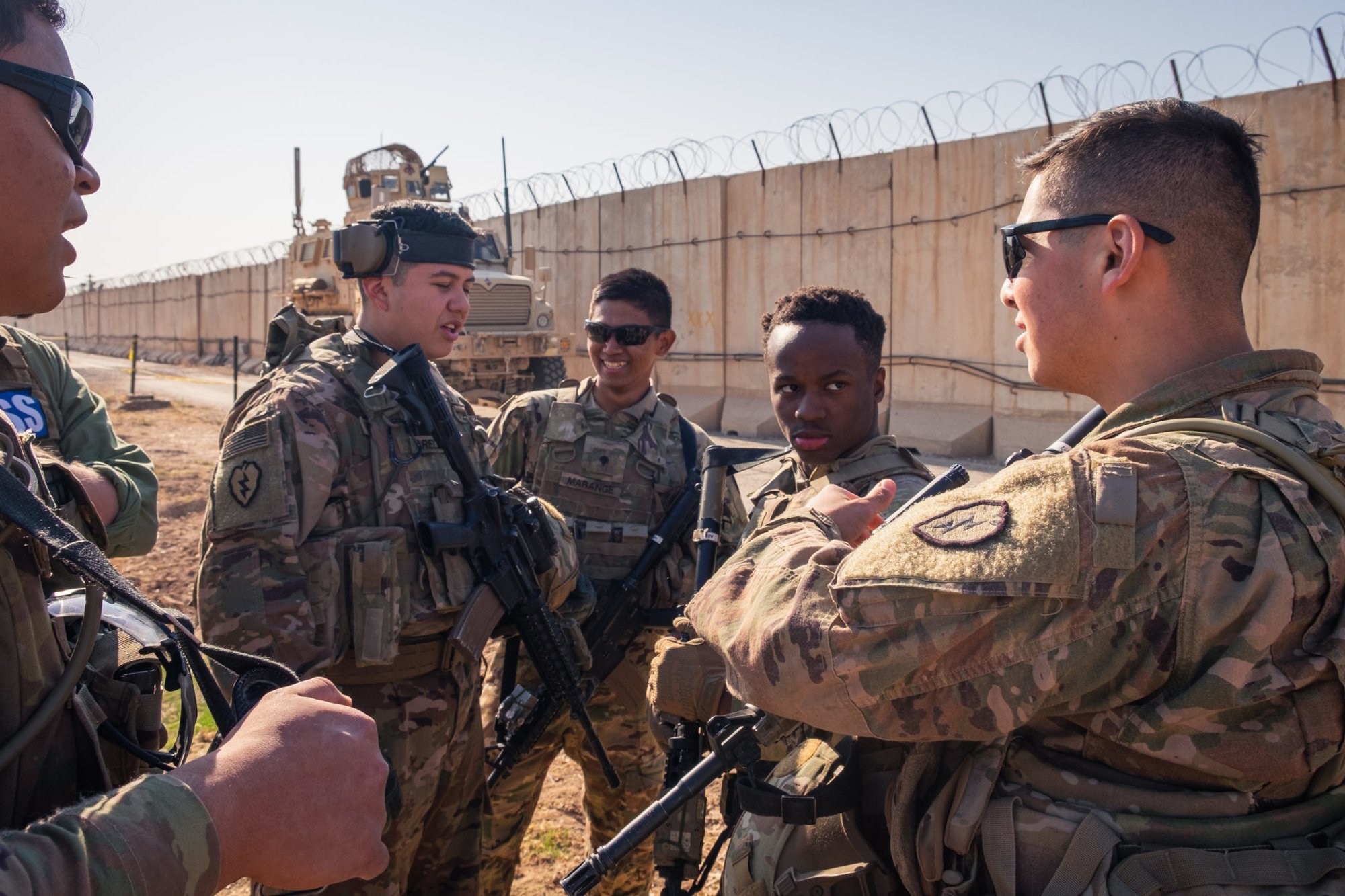
Feliz Navidad! Feliz Navidad!” Specialist Hester belted out the lyrics to the Christmas song as he and fellow soldiers sat waiting for their mission to start. It was a sunny November morning as soldiers with the 1-24 Infantry Battalion’s Alpha Company waited for a mission outside the wire to a town near Qayyarah West Airfield, the Iraqi base they operate out of that most American troops know simply as “Q-West.”
“I want to wish you a Merry Christmas!” Hester continued, but a fellow soldier — Specialist Gomez — interrupted him. “It’s ‘weesh’ man, I want to ‘WEESH’ you a Merry Christmas,” he said as he jokingly emphasized the accent.
“We haven’t even had Thanksgiving, I hate this,” Private First Class Duke, another soldier sitting a few feet away, chimed in.
“I could listen to Christmas music all year — do you just hate happiness?” Specialist Knesek replied.
“You’ve never worked retail, have you?” Duke shot back.
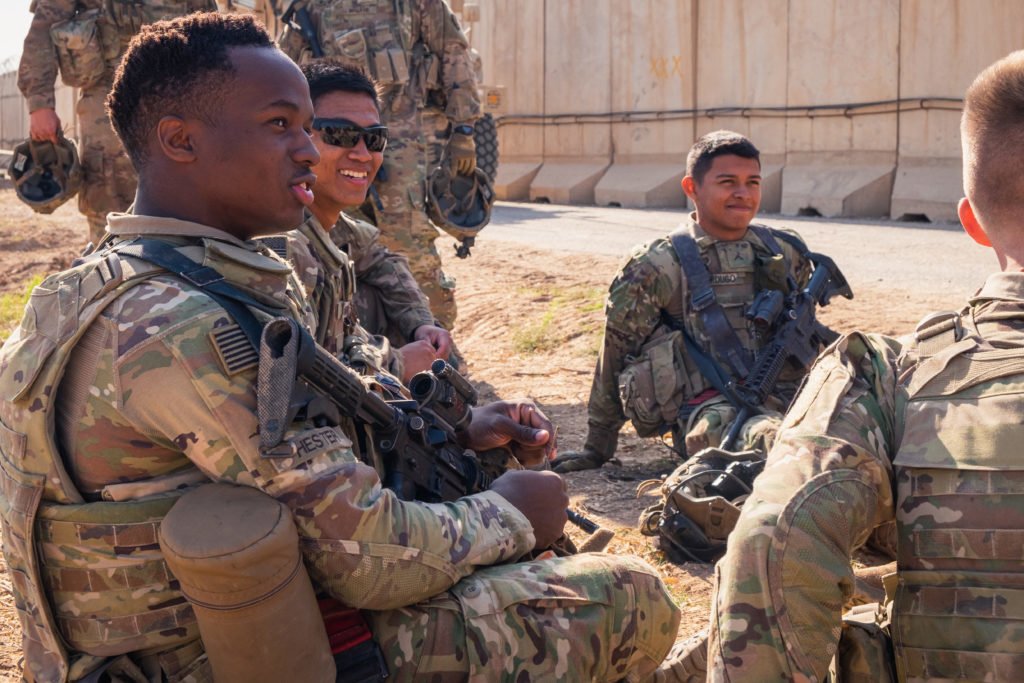
The soldiers’ mission that day was to provide security for their company commander, Captain Colin Grant, as he conducted a Key Leadership Engagement (KLE) with Sheik Hussein, an important Sunni tribal leader who lives in a village just outside of the base. Meanwhile, engineer officer First Lieutenant Caitlin LaNeve and a medical officer (who requested not to be named) conducted an assessment of the town’s health and infrastructure.
Alpha Company was more broadly responsible for the security of the American compound at Q-West that housed the 2-8 Artillery Battalion. They provided perimeter security, acted as the quick reaction force in case of attack, and were one of the few conventional units on base that conducted operations “outside the wire.”
The soldiers continued singing and joking as they awaited orders. While spirits were high, several of them were nervous. Just over a week before, Khatib Hezbollah, an Iranian-backed Shia militia faction of the Iraqi Popular Mobilization Forces (PMF), struck Q-West with rockets. Tensions between Iranian-backed PMF factions and U.S. troops — technically allies in the fight against ISIS — were escalating.
The escalation would continue, giving U.S. troops what proved to be a tumultuous Christmas and New Year in Iraq that included more rocket attacks, a militia-led storming of the U.S. embassy, the American-targeted killing of Iranian general Qassem Soleimani and deputy PMF commander Abu Mahdi al-Muhandis, and an Iranian ballistic missile attack on Al Assad Air Base that has resulted in what the Department of Defense now estimates to be around 100 traumatic brain injuries.
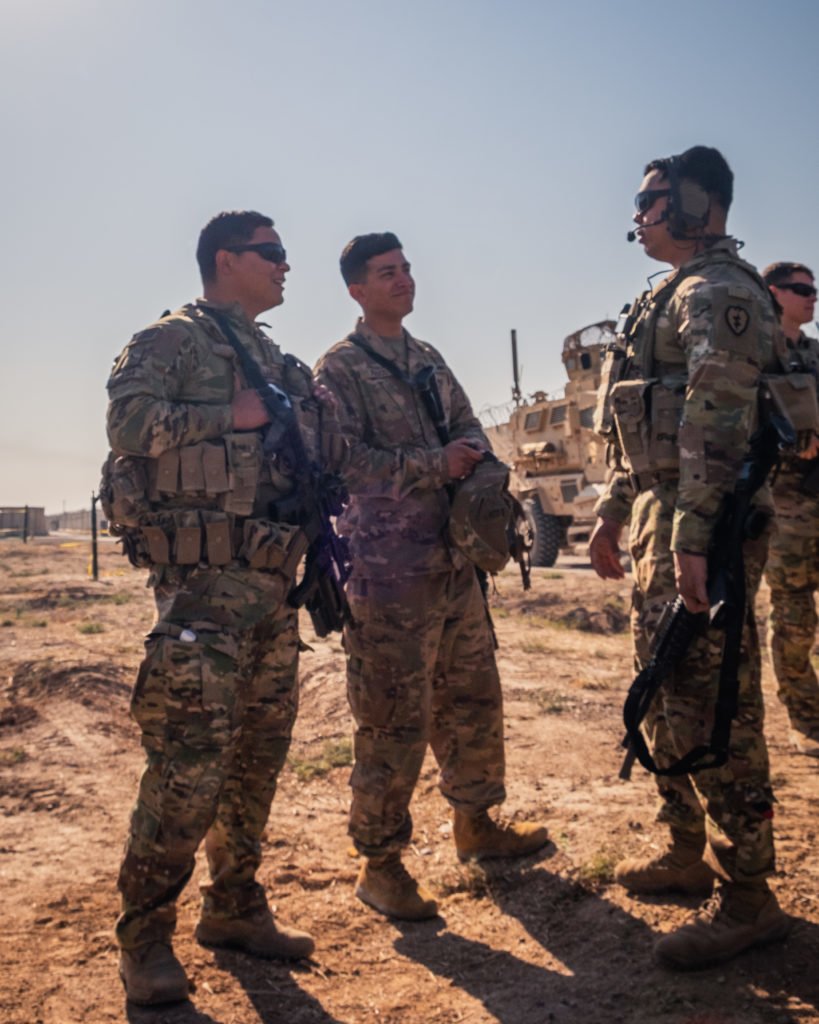
Much has changed on the ground since then. After killing Soleimani and al-Muhandis, Coalition forces largely suspended anti-ISIS operations to focus on defend positions. Though some operations have resumed, tensions remain high and sporadic militia rocket attacks are ongoing. ISIS militants have been actively regrouping in Iraq’s northwestern regions, and despite the group losing its physical territory, they remain stubbornly resilient.
Fierce anti-government protests rage in the south as Iraqis express frustration with corruption and economic stagnation — and demand reforms. Meanwhile, Iraqi forces continue fighting ISIS, most recently launching an operation along the Iraqi-Syrian border without the help of either the Coaliton or the PMF.
Coffee or Die embedded with U.S. forces last year as tensions began mounting, getting an up-close look at the situation on the ground as U.S. troops tried to adapt to rapidly changing conditions — from shifting political realities, rapid redeployments, and emerging threats.
One old man in the village has eight wives and 60 kids,” Sheik Hussein told Grant as they sipped tea in a tent on the American compound at Q-West. Hussein was visiting the base to talk to the company commander before Grant’s troops visited his village. It’s not their first meeting, and Hussein has visited the base many times. “Nas,” an Iraqi-American linguist, translates. Nas has worked at the base for some time and has a long relationship with Hussein.
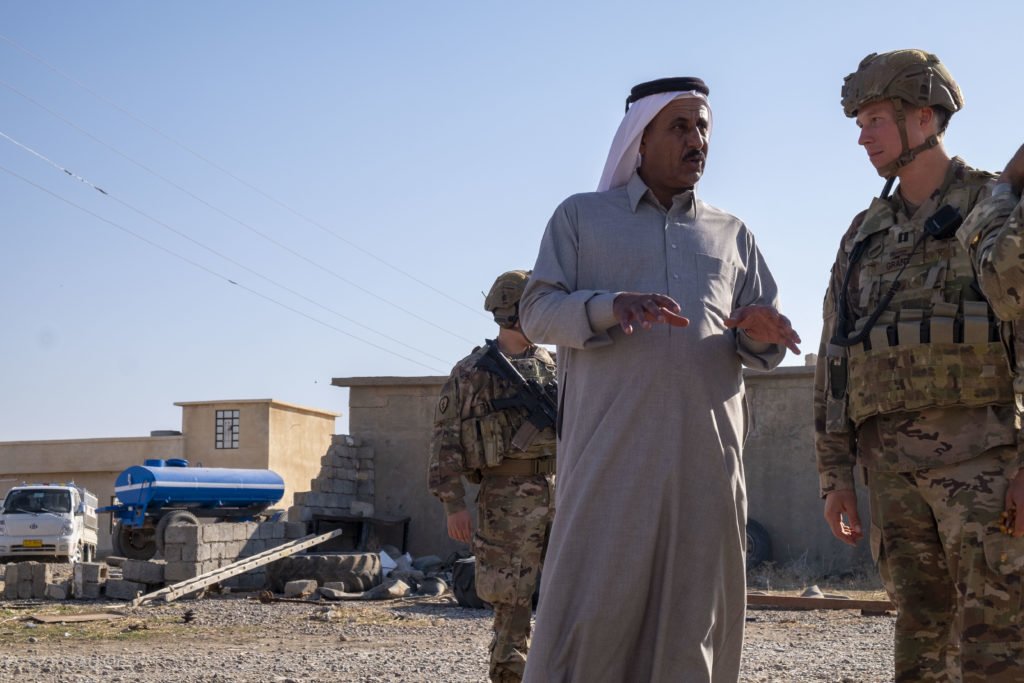
“I only have one wife, and she’s a handful for me,” Grant responded. He continued that his own father used to joke that he’d had two children so that they would do all the housework. Hussein laughed. “I mean, we can get you a wife,” he told the infantryman. Grant blushed slightly and responded, “I think one right now is more than enough for me. I’m not as good as you guys, I can’t handle more than one wife.”
The Sheik said that he has two wives and that they’ve been nagging him to take another younger wife so that they can take a break from taking care of the home. “I don’t think my wife will sign off on that,” Grant responded.
They talked about local concerns, conditions in the region, and movements of ISIS remnants — as well as their relationship with each other. Hussein told Grant that several locals wanted him to inquire about three Iraqi brothers who lost their jobs at Q-West with contractor KBR, saying that they were fired without notice and with no reason given. Local leaders wanted an explanation. Grant said he would look into it.
Grant asked the Sheikh about unexploded ordnance in the area. ISIS left countless bombs and booby traps in Iraq’s cities, towns, and countryside that still maim and kill Iraqi civilians and security forces — and potentially pose a danger to Coalition troops when they leave the wire. “I don’t want any surprises when we come to visit you later this week,” Grant said.
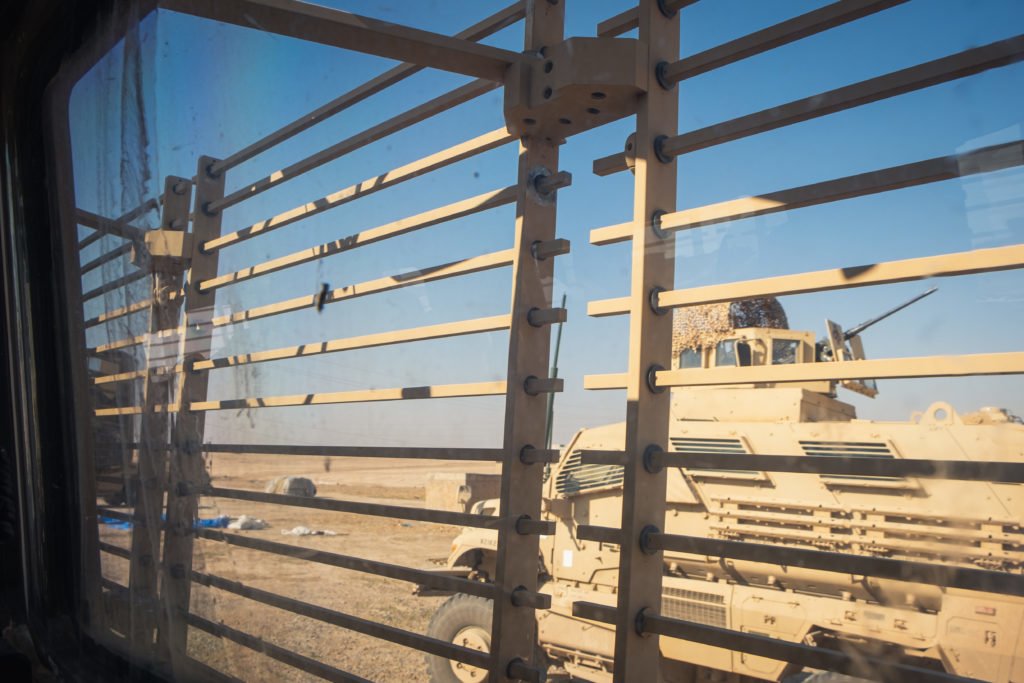
Hussein assured him that, to his knowledge, the road into his village was safe. His long history of working closely with American forces dates back to the pre-ISIS days before American forces returned to Iraq. American aid programs once bolstered his village, and he recalled the names of countless soldiers he’d met over nearly two decades.
But his close relationship with the Americans also came at a steep cost. He and members of his family were frequent targets of assassination attempts. Insurgents successfully killed his brother, one of the few doctors in the rural region. When ISIS took control of Q-West, the militants drove him and his people out of the village, leaving it abandoned. They returned only after Iraqi and Coalition forces retook the base and turned it into a launchpad for the push into Mosul.
The U.S. Army’s conventional infantry are used to being the “tip of the spear” in America’s wars, storming enemy positions and kicking in doors. Their common refrain was “if you ain’t infantry, you ain’t shit.” But in recent years, the Pentagon has increasingly put its emphasis on elite special operations forces supporting local fighters with artillery and air support. Conventional infantry have increasingly taken on the job of guarding bases or providing “uplift” support for special operations troops.
In Iraq, the Army has divided infantry battalions like 1-24 and spread them across the country to support various bases and provide backup to SOF and other troops. During this deployment, Alpha Company has answered to the 2-8’s Battalion Commander, Lieutenant Colonel Stephen Thibodeau, rather than 1-24’s battalion leadership in Mosul. Q-West has essentially operated as the nerve center for artillery operations, and Thibodeau calls the shots there.
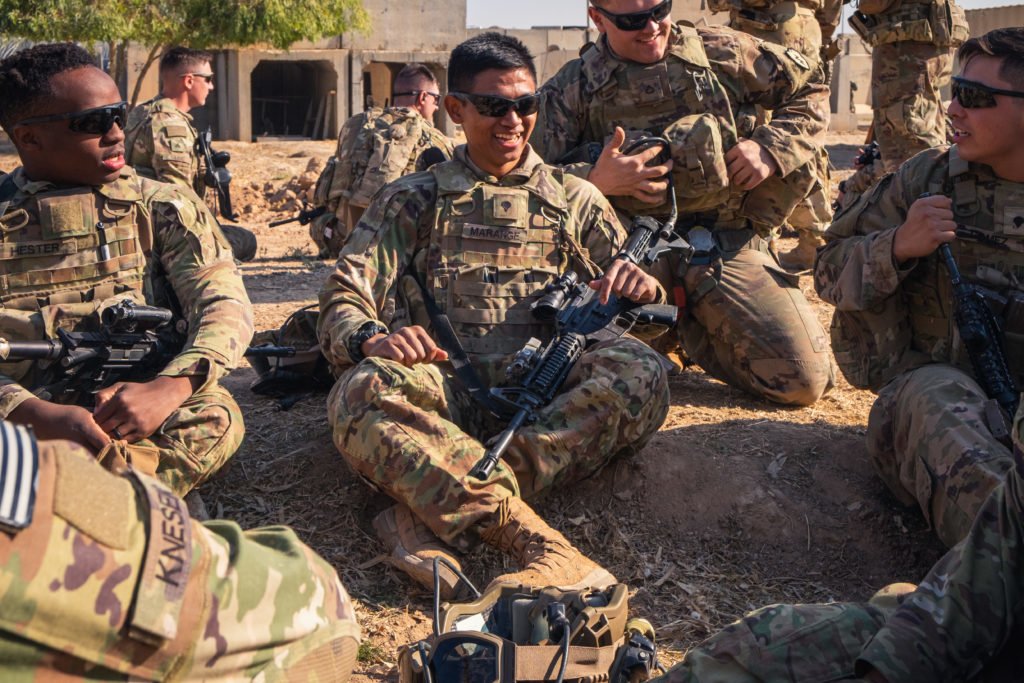
However, Grant bristled at the notion that he and his troops were playing a mere supporting role for the artillery mission. “Yes, we’re supporting with the defense and the perimeter defense of Q-West to enable the fire support mission, but we’re also going to be pretty active,” he said. While 2-8 has access to a wide variety of surveillance and intelligence sharing with local forces, Grant and his troops are the face of the mission in interacting with Iraqi forces and local villages. “We’re able to go out and actually do our job,” he added.
Thibodeau said that having infantry on hand is a vital component to making his mission successful. “There’s nothing that replicates that […] on a day-to-day basis, it can feel like disconnection and more orientation from what we can see through various sensors throughout the area,” he said of having infantrymen able to conduct operations in the area. “There needs to be a mutual level of trust, and that level of trust can’t happen with just talking on a cell phone.”
This would be Grant’s first trip outside the wire meeting with the Sheik in his home rather than hosting him on the base. But it wasn’t the first mission outside the wire for the platoon of soldiers he would be taking. The Coalition had previously pulled troops from Alpha from Q-West temporarily to send them to Northeast Syria to assist with the sudden withdrawal of American forces as the Turkish Army and allied Islamist militia forces invaded in October.
The soldiers didn’t talk much about their experience in Syria. When U.S. troops withdrew from the region, several Kurdish and Arab locals who had previously seen the Americans as liberators for helping to drive out ISIS threw rocks at their vehicles while others tried to block the roads and beg the soldiers not to leave. During the Turkish invasion, ISIS cells took advantage of the chaos to launch several attacks, and many ISIS prisoners escaped custody — some making their way to the Iraqi-Syrian border to join regrouping fighters.
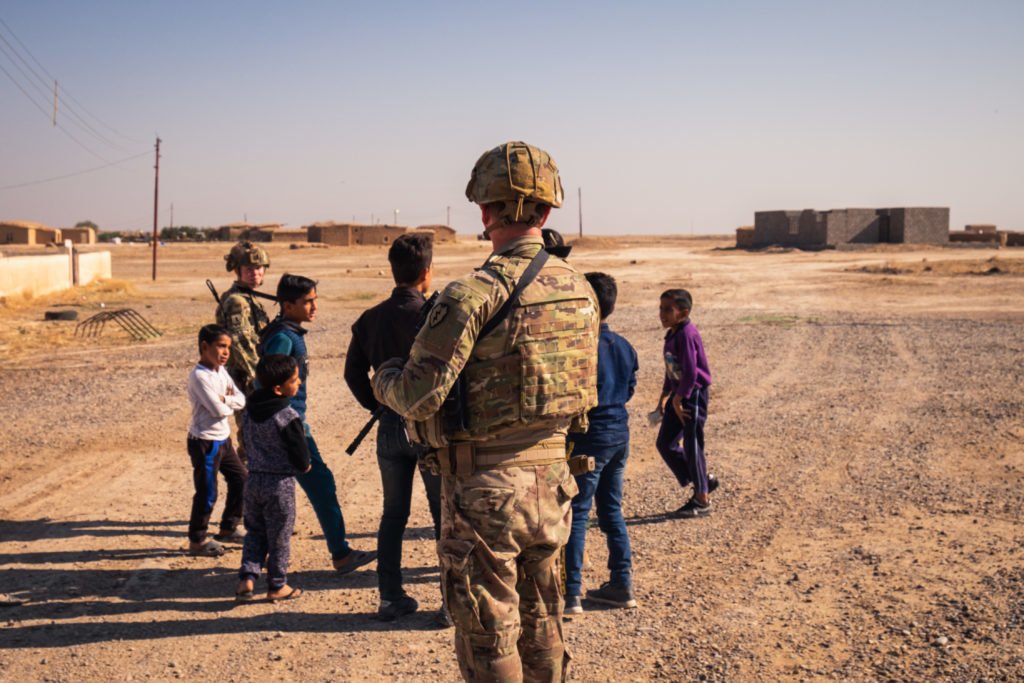
American troops have since returned to Syria with a reduced presence largely centered around oil fields, and special operations forces have resumed operations against ISIS alongside the Syrian Democratic Forces. The conflict in Northeast Syria has become increasingly complicated with the presence of American, Turkish, Russian, and regime forces all converging on the region as cold winter temperatures take their toll on civilians displaced by the Turkish invasion. Many Syrians remain vocally bitter about the withdrawal even as American forces work to regain their trust.
As the infantrymen tend to their duties at Q-West, the legacy of war in the region is evident all around them. Outside the walls of the American compound, U.S. troops can see the wreckage of a once well-established base. As Iraqi and Coalition forces drove ISIS out of the base in 2016, both heavy shelling and ISIS scorched-earth tactics left much of it in ruins. The Iraqi military has struggled to rebuild it, in no small part because the facility is still littered with unexploded bombs and booby traps that ISIS left behind.
In protecting the Coalition compound’s perimeter, Alpha Company worked closely with contractors from Triple Canopy, a security company that was once a rival to the controversial firm Academi (formerly Blackwater) but merged with the company in 2014. The contractors at Q-West are a mix of U.S. and British military veterans, as well as Ugandan hired guns.
In one of the watchtowers along the perimeter, a young soldier shared guard duty with a jovial Triple Canopy guard named Francis from eastern Uganda. Francis had a wide, toothy grin and a well-worn Kalashnikov rifle by his side. “I’ve just been sitting here listening to him,” the soldier said, motioning to the Ugandan guard. “He’s got crazy stories.” Francis said he first came to Iraq in 2008 and has been working in the region since.
“There needs to be a mutual level of trust, and that level of trust can’t happen with just talking on a cell phone.”
Francis had previously guarded the American consulate in the southern city of Basra and said that he and fellow guards weathered multiple attacks a day at various points while they were there. The U.S. consulate in Basra closed in September 2018 after a rocket attack that U.S. officials said was conducted by Iranian-backed militias. That attack took place in the midst of intense clashes between Iraqi protesters and the government that some Iraqis now consider a prelude to the current protest movement that has taken the whole country by storm.
Guard duty is rarely exciting. “We know there’s a threat, so we’re always focused,” said a soldier in another guard tower. “I like to look at a specific set area and slowly work my way across and up.” The soldiers do regular radio checks and other mental exercises to keep themselves focused. Another soldier pointed to towers beyond their wall where Iraqi soldiers were supposed to be on duty. “That’s supposed to be our outer security — their security — but nobody’s home.”
However, American soldiers at Q-West were quick to add that Iraqi troops mobilized swiftly when Kataib Hezbollah struck the base on Nov. 8, 2019. “[The attack] definitely broke up the monotony. It was getting pretty boring,” said a soldier as he scanned the horizon. “It went from zero to 100 real quick.” Several American officers noted that Iraqi troops made it to the truck that launched the rockets before a team of U.S. Marine Special Operations Forces did, and they turned it and the rocket tubes over to the Americans for investigation.
At a briefing for the troops going to visit Sheik Hussein’s village, soldiers huddled around a terrain mockup of the area as the platoon leader, Second Lieutenant Brian Dude, led the briefing. Dude explained what they would be doing, where they would be going, and what to do if they ran into ISIS. A fresh lieutenant, Dude’s relative inexperience shows, though fellow officers said there’s always a learning curve for new officers. As Dude opened up the floor for questions about the mission, Sergeant Corbin Mason, a 22-year-old from Arizona, asked the question on everyone’s mind: What are the rules of engagement if they run into the PMF?
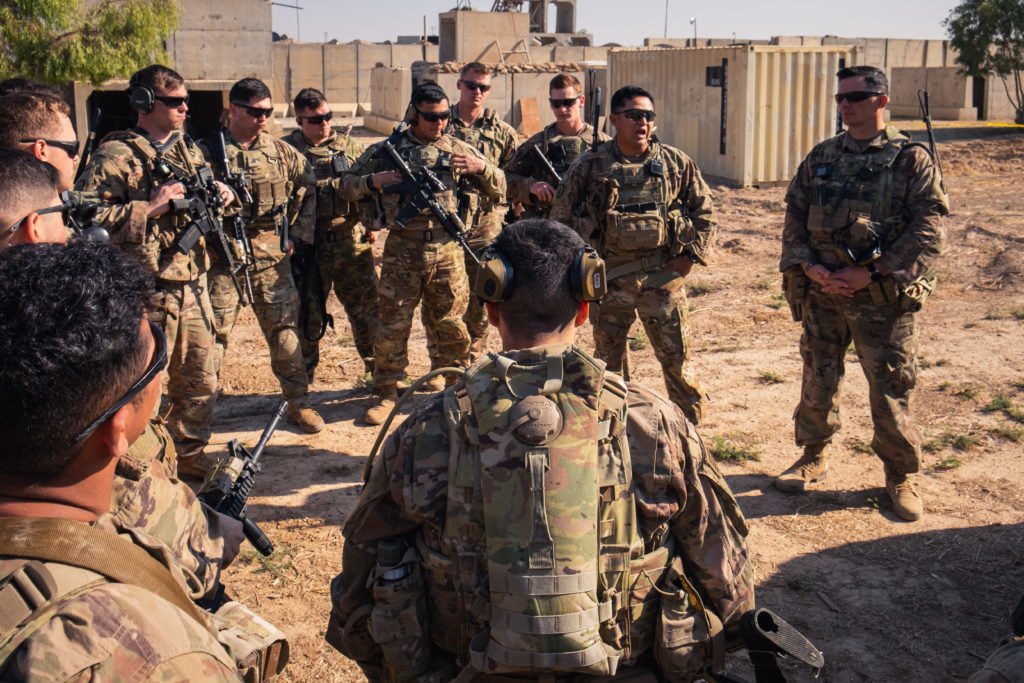
Sergeant First Class Eric Cole, the platoon sergeant, fielded the question. “The PMF is not the enemy — they are a ‘non-compliant actor,’” he added with a hint of sarcasm. He continued that if they did run into the PMF, they would be cautious but professional and would absolutely not start a fight with them. Cole said that the only reason to fight them is if they fire first. “If that happens, you know what to do.”
“So, like Syria,” Corbin replied in acknowledgement. From the back of the room, Grant addressed the soldiers to emphasize that a fight with the PMF is the last thing they want. “They may try to bait you or antagonize,” he said, warning that militiamen could try to instigate a confrontation for propaganda value to stoke anti-American sentiment. He added that if they do get into a confrontation, their priority will be to de-escalate and return to Q-West as quickly as possible to avoid a major incident.
On the day of the mission, after a long stretch of “hurry up and wait,” soldiers loaded up and boarded their MRAPs. Triple Canopy guards waved them by as they left the compound. On the other side, they checked in with Iraqi troops to link up with their escort — unlike during Operation Iraqi Freedom (OIF), American troops can’t go anywhere without the approval of Iraqi officials and must be accompanied by Iraqi soldiers or police on operations. Once the two sides sorted everything out, they were on their way.
It was a bumpy ride to the village, and the vehicles lurched and bounced. As the soldiers pulled into the village, local Iraqi children were the first to approach the vehicles, looking up and waving at the soldiers. As the soldiers stepped down from the vehicles and began setting up a perimeter around the village, children swarmed several of them, eagerly wanting to practice their English. “What’s your name?” they asked.
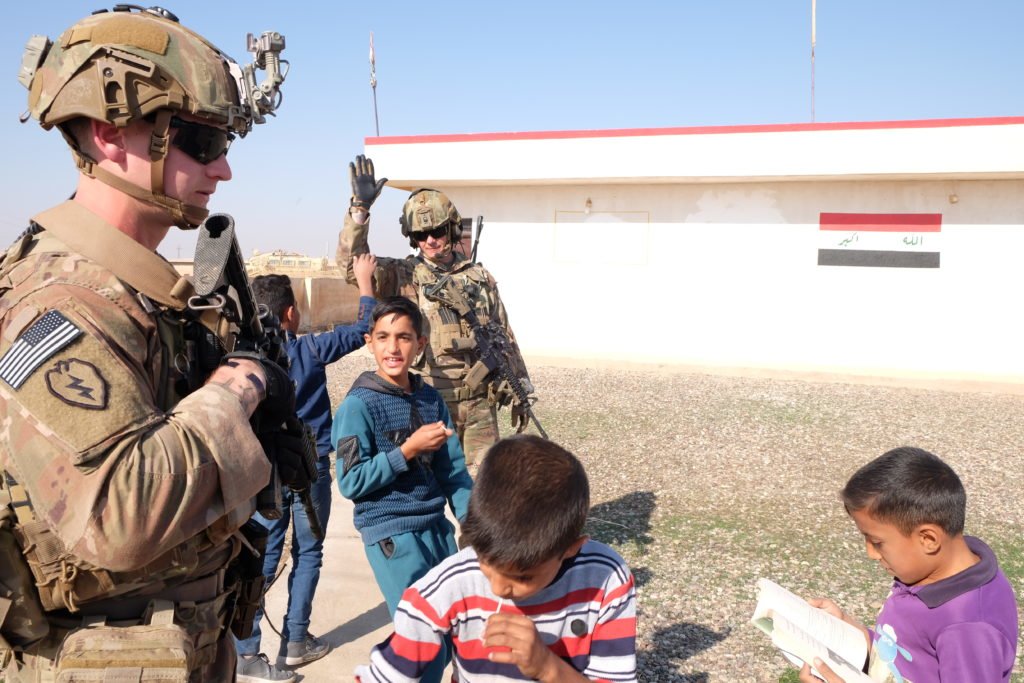
As Grant and Dude went to meet with the Sheik, LaNeve and the medical officer broke off to conduct their assessment of the village. Also with them was Dalia, a contracted Iraqi-American linguist decked out in olive drab, who is from San Diego. Cole and Mason accompanied them to provide security.
Iraqi children followed the group as they walked toward the school and medical clinic. The children continued asking questions of the soldiers as they walked. Several asked for pens and pencils. Some of the more brazen ones tried to grab pens and other items off the soldiers’ vests (some successfully). Mason swatted them away, having recently learned the Arabic word for “no” as he repeatedly said “leh, leh, leh” as he walked. Cole smiled at the children as they came up to shake his hand, he asked them their names.
As they continued walking, several village dogs barked from their porches. “Bow wow!” said a little girl, who grinned as she pointed to one of the dogs. Dogs aren’t common as pets in Iraq due to long-held cultural stigmas regarding them as unclean, but the dogs in the village are clearly healthy. Some soldiers wondered later if the Sheik’s evident pro-American sentiments and close relationship with U.S. troops during OIF had somehow shaped the local attitude toward the animals.
Eventually they reached the school and clinic. The clinic had no medical supplies of any kind, villagers explained to LaNeve and the medical officer through Dalia. They said that when ISIS took over the town, they looted the medical supplies and took everything of value and/or utility they could repurpose for their fighters to use.
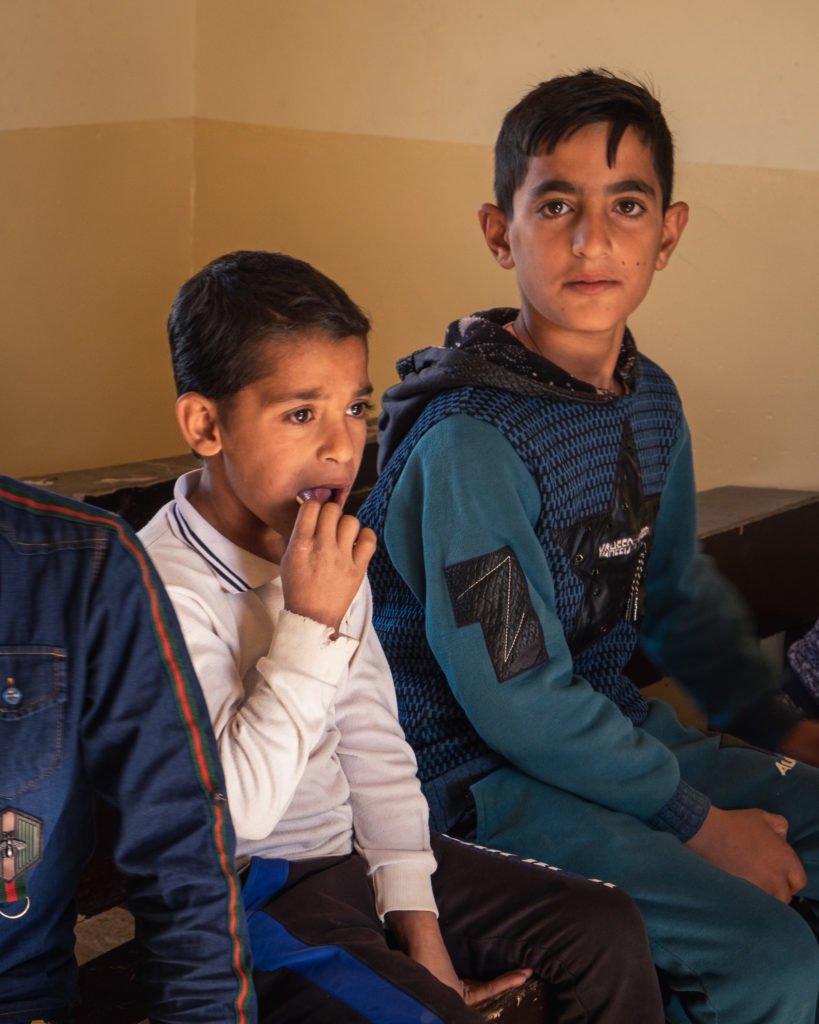
In the other room, Cole chatted with several young boys that had followed the group. They were fascinated by the tattoos covering his arms. They asked him if they were “drawn” or permanent. He told them they’re permanent, and the boys looked impressed. An Iraqi linguist who translated for them told Cole, “They say they want tattoos now.”
“It looks like I’m setting a trend,” Cole responded with a chuckle. One of the boys pointed to a bracelet Cole was wearing — a memorial bracelet with the names of fallen comrades he’d served with. The boy tried to grab the bracelet. For the first time on the mission, Cole raised his voice, firmly telling the child, “No. You can have a pen, but you can’t have that. It’s very personal to me.” He explained to the children that he wears it for his friends who have died.
As the assessment team finished up in the clinic, the group moved back into the courtyard and over to the school. Several children passed around an Arabic-to-English book pointing to words and asking soldiers how to pronounce them. Some of the boys began climbing on Cole; several grab onto his arm as he pulled them up. Others try to do the same with Mason but back off quickly when they realize he has no interest.
After LaNeve and the medical officer finished up checking out the area and taking notes, the group began heading toward Sheik Hussein’s home for lunch. Several villagers welcomed the group. Some of the soldiers were set up in defensive positions, while others entered the home for the meal. One asked Mason if he wanted lunch. “No, I’m not going in there,” he replied.
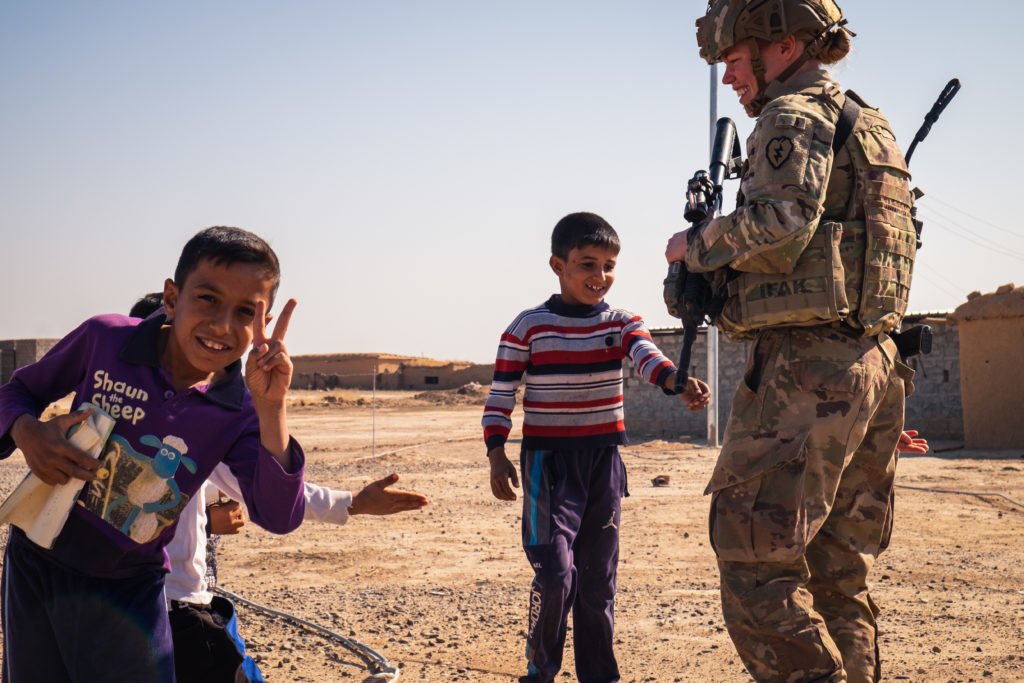
Inside, Grant and Dude chatted with Hussein as soldiers took their seats and Iraqi men brought them tea and water. Not long after, enormous food dishes filled the room. The soldiers began tearing into the feast.
As they ate, they continued to learn about the village. The assessment team asked Sheik Hussein about the clinic and where the villagers get medical treatment. He said that the government sends a doctor to town once a month, but that he never arrives with medicine or supplies and provides little to no treatment.
It’s no secret that the Shia-dominated government has largely neglected Sunni areas, and the Sheik said he didn’t have confidence that anyone in Baghdad was serious about restoring access to medical care to his people. To make matters more difficult, ISIS’ scorched-earth tactics resulted in damage to the road system to slow the advance of Iraqi forces toward Mosul, which has now slowed the flow of aid and commerce to several parts of the country — including this one.
As they ate, the Sheikh brought out photo albums and other heirlooms to show the soldiers. Many are photos of him with American soldiers that had deployed to Saladin province. He also showed off a collection of various challenge coins he’d received from U.S. troops. Some of the soldiers were shocked that he kept them all these years. “There are people in this country that would kill you for having these,” said one soldier.
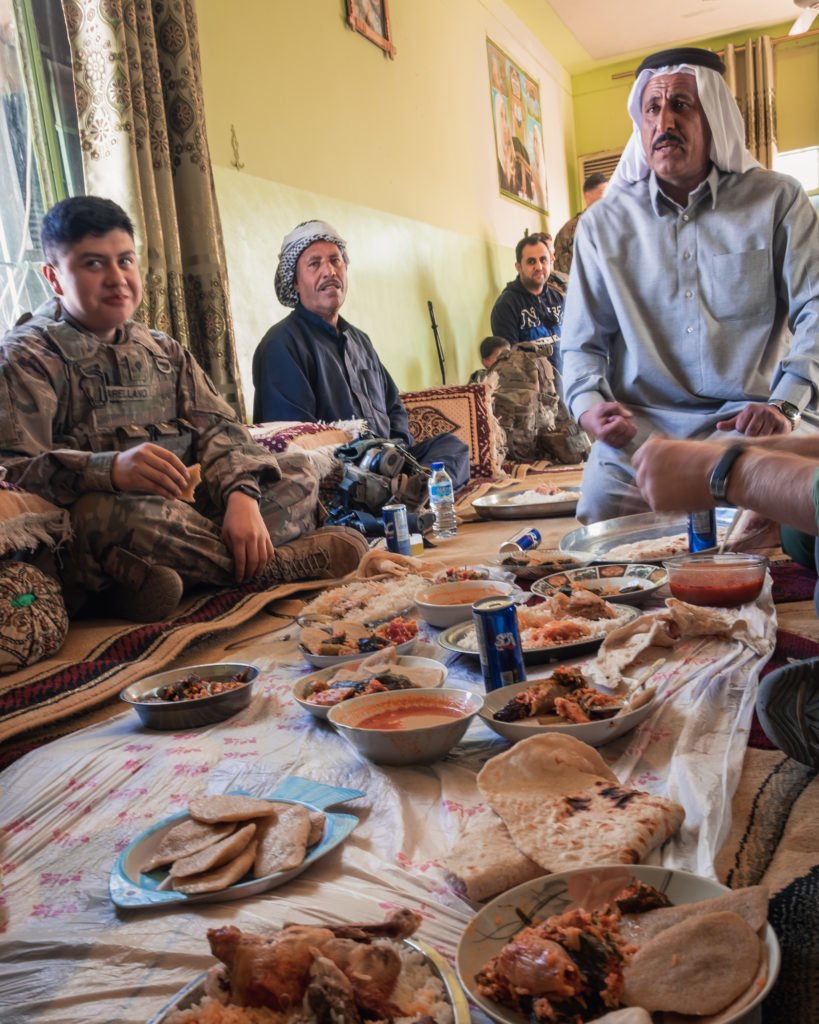
“This actually really reminds me of home,” Dude said as he ate. He explained that his family is Navajo and had grown up on the reservation in Arizona. “The food, the architecture, a lot of this is actually really similar,” he said. “I guess desert people just kind of have things in common.”
Iraqis continued bringing in food and tea. “Every time I’m about to finish, they just bring more. I’m never going to finish this,” a young private said.
“It’s the custom,” Dalia told him.
The Iraqis began cycling soldiers pulling guard duty outside into the home so they could have tea and a portion of the meal. Eventually they brought in a reluctant Mason and sat him in a chair next to a small table. He gradually relaxed as he sipped tea and the Iraqis joked with him.
Outside the window, children continued going up to soldiers posted around the village to talk to them. Some of the soldiers took turns between guarding the perimeter and entertaining the kids. Eventually all the soldiers had gotten their fill of food and decided it was time to leave — though several requested bags and boxes to take leftovers back to base. The villagers also brought fruit to give everyone as they left.
Cole has had a lot of experience dealing with Iraq’s children. … “They’re a good early warning system.”
As they were leaving, a soldier asked Mason how his lunch was. “The tea was really good,” he admitted with a grin. Outside, Grant and Dude went up to the Sheikh’s roof where they continued talking. Cole was again swarmed with children. One asked him for a pencil. “I don’t got a pencil. You took all my pencils. I got an orange,” he said holding up an orange that one of the villagers had given him. “You want an orange?”
“If you’re good, we’ll bring you candy next time,” Cole said to the boy. “But you have to be good.”
Cole’s last deployment to Iraq was 10 years ago; he’s deployed to the country five times and saw some of the bloodiest days of OIF, including the deaths of many soldiers and civilians. Cole has had a lot of experience dealing with Iraq’s children. While some soldiers find them annoying, he prefers dealing with them rather than insurgents. “They’re a good early warning system,” he said. “When they’re like this, it means you’re probably safe. It usually means the people in the village are friendly and you’re not going to get attacked.”
As the soldiers began to climb back into their vehicles, the villagers waved. It was a learning experience for many young soldiers. “I wasn’t really expecting the kids to be on us like that — I just wasn’t really ready for that,” Mason said. He added that he was struck by the poverty. “I was expecting it to be more Westernized, but there was nothing there.”
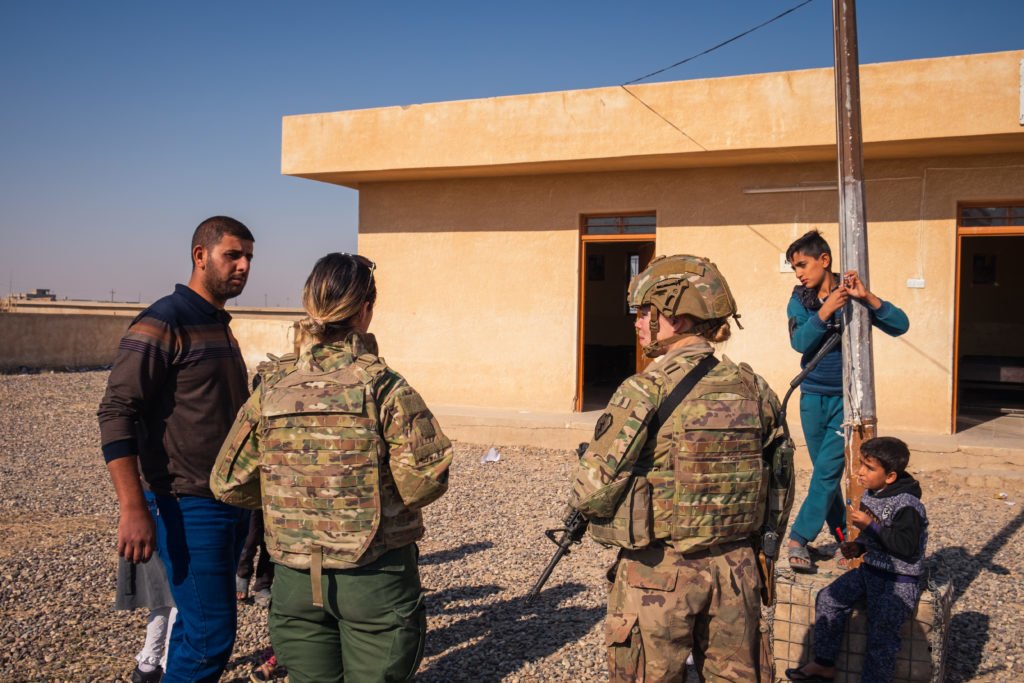
Before deploying, Mason had heard mixed messages about the Iraqis around the base. Soldiers who had come through previously warned him and other soldiers that the local forces were “sketchy.” He was still making up his mind about them — though the rocket attacks were certainly coloring the experience. But he said that the Iraqis he saw in the village were “people who have endured a lot. I’ve got a lot of respect for them.”
Upon returning to base, Grant and the assessment team wrote up reports on their findings. It was as much about gathering intelligence and learning about the area as it was about good will.
“We are obviously invested in their community being strong,” Thibodeau said. Not only is being a good neighbor important due to the proximity, but Thibodeau pointed out that Hussein and his people are best able to identify and report any unfamiliar or suspicious people moving around the area. They have already made an enemy of ISIS, and it’s in their self-interest to keep them from returning.
For much of 2020, the mission at Q-West has focused on a more defensive posture. Iranian-backed militias continue to launch periodic rocket attacks on American positions as U.S. troops hunker down. Q-West had already been slated for a potential reduction in forces before the rocket attacks started; it’s unclear what the coming months hold.
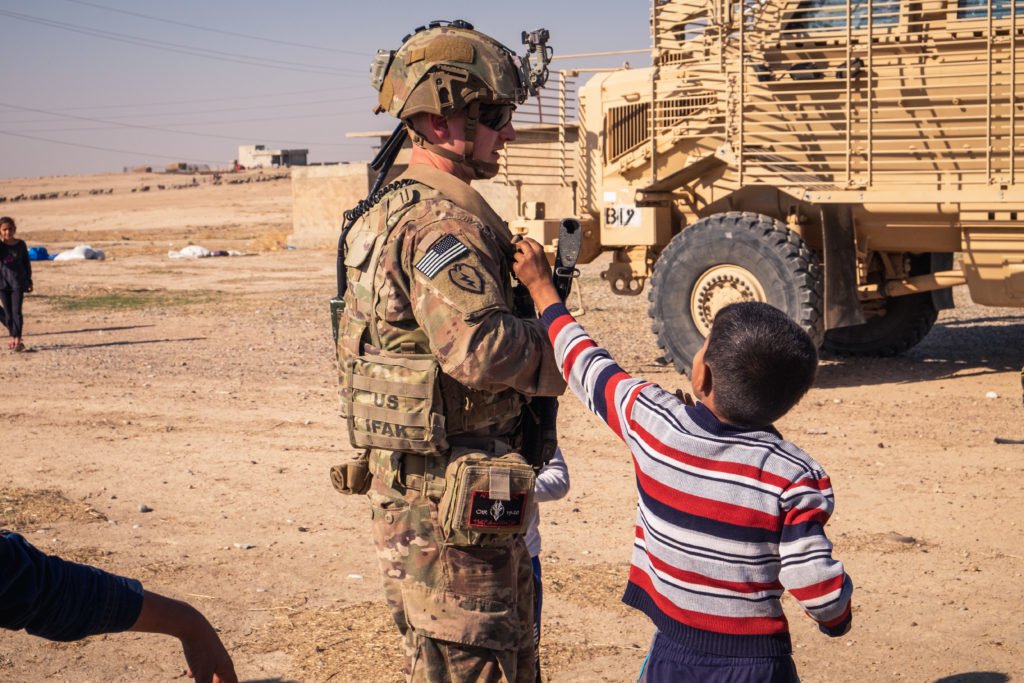
The mostly Sunni province of Saladin has suffered from periodic violence by ISIS cells, but many Sunni locals are equally worried about Iranian-backed militias, if not more so. During their march north, many participated in looting, kidnapping, and ethnic cleansing against Sunnis. Several militia-tied members of the Iraqi parliament’s Shia bloc have pushed to evict U.S. troops from the country.
Sunni and Kurdish members of parliament boycotted the vote. Some news outlets have reported on supposed secret talks between Sunni leaders and American officials to carve out an autonomous Sunni area to the north — similar to the one controlled by the Kurdish Regional Government — that would keep American troops in the region, but several of the alleged participants have flatly denied any such effort.
However, many Sunni and Kurdish leaders do seem nervous about the prospect of American withdrawal and Iranian influence widening. Even some Shia protesters to the south who are demanding an end to foreign meddling in their country seem torn on the rate at which they want American forces to leave. “[The] US troops presence in Iraq is very important for our protection,” one told Kurdistan-based outlet Rudaw. “If the US troops [are] expelled now, we as protesters will be the biggest losers, as Iranian-backed militias will kill all of us in days.”
The Prime Minister of Iraq’s semi-autonomous Kurdish region, Masrour Barzani, recently told The Atlantic that he believes ISIS has actually grown more dangerous and may have more fighters even if it has lost its territory. He also believes that abuses by militias — and the ongoing tensions between them and American forces are disrupting the fight against ISIS. “This confrontation definitely will have a negative effect on the fight against terrorism and ISIS, which should be the priority for all of us,” Barzani said.
The challenges American troops face in Iraq change by the day. But one thing seems to remain certain — whatever shape their mission takes and however it concludes, the infantry will be there until the end.
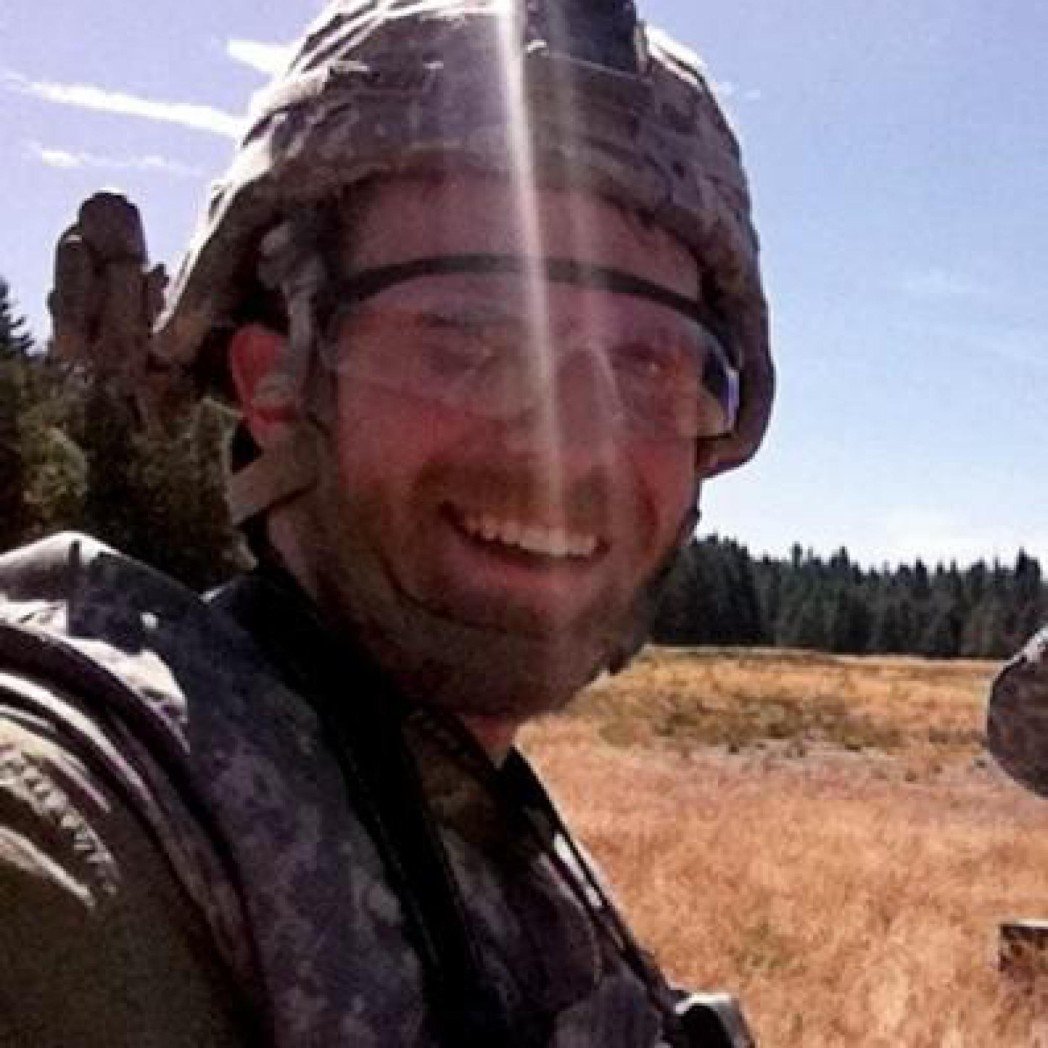
Kevin Knodell is a freelance journalist and author. His work has appeared at Foreign Policy, Playboy, Soldier of Fortune, and others. He’s the associate producer of the War College Podcast and a former contributing editor at Warisboring. He’s the co-author of the graphic novels The ‘Stan and Machete Squad, and he currently writes the Acts of Valor comic series for Naval History magazine.
BRCC and Bad Moon Print Press team up for an exclusive, limited-edition T-shirt design!
BRCC partners with Team Room Design for an exclusive T-shirt release!
Thirty Seconds Out has partnered with BRCC for an exclusive shirt design invoking the God of Winter.
Lucas O'Hara of Grizzly Forge has teamed up with BRCC for a badass, exclusive Shirt Club T-shirt design featuring his most popular knife and tiomahawk.
Coffee or Die sits down with one of the graphic designers behind Black Rifle Coffee's signature look and vibe.
Biden will award the Medal of Honor to a Vietnam War Army helicopter pilot who risked his life to save a reconnaissance team from almost certain death.
Ever wonder how much Jack Mandaville would f*ck sh*t up if he went back in time? The American Revolution didn't even see him coming.
A nearly 200-year-old West Point time capsule that at first appeared to yield little more than dust contains hidden treasure, the US Military Academy said.












